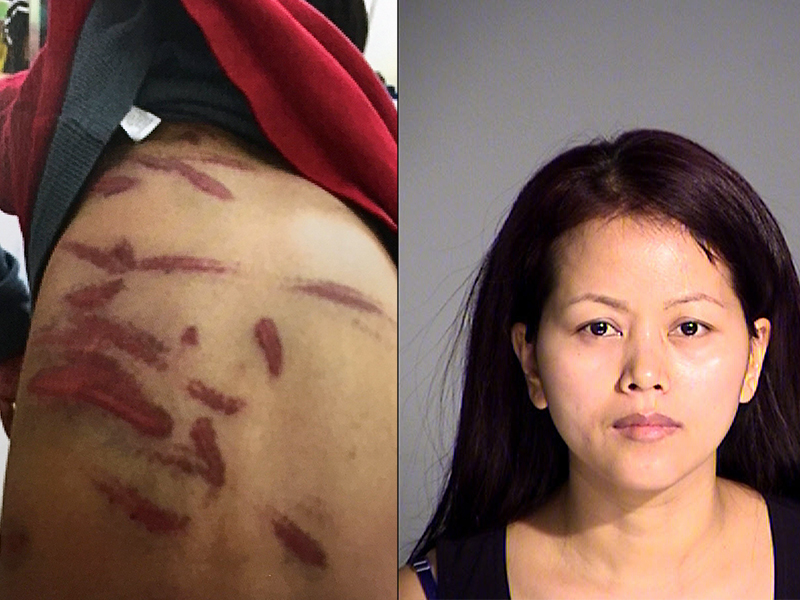
An Indiana mother who beat her son dozens of times with a coat hanger – and used the state’s new “religious freedom” law to justify the punishment – has been sentenced to a year of probation after pleading guilty to battery.
Kin Park Thaing was sentenced in Indianapolis on Friday, about eight months after she was accused of beating her 7-year-old son, who caught a teacher’s attention when he showed up to school with 36 deep-purple bruises on his body.
Her case, according to the Marion County prosecutor, was the first time Indiana’s new religious freedom law was used as a defense in punishing a child.
The 30-year-old mother was charged with battery on a person less than 14 years old and neglect of a dependent, both of which are felony charges that were dismissed as part of a plea agreement with prosecutors, online court records show. Thaing pleaded guilty to battery with moderate bodily injury, which is punishable by up to a year in jail in Indiana.
She was sentenced to a year in jail, which she will serve through probation.
In July, Thaing asked for the charges to be dismissed. Her defense attorney, Greg Bowes, argued in court records that Indiana’s “religious freedom” law protects her from prosecution.
The state’s Religious Freedom Restoration Act, or RFRA, was signed into law by Gov. Mike Pence (R) last year. The law says the government must first prove a compelling interest before it intrudes on someone’s religious liberty, and it must do so in the least restrictive way.
Thaing’s Christian beliefs were the “guiding values” that influenced her behavior when she punished her son, according to a motion to dismiss. It also cited verses from Proverbs 23:13-14: “Do not withhold discipline from a child; if you strike him with a rod, he will not die. If you strike him with the rod, you will save his soul from Sheol.”
The incident happened on Feb. 3, when Thaing became angry after she saw her son and 3-year-old daughter showing each other their genitals in the upstairs bathroom of the family’s home in Indianapolis, according to a probable cause affidavit. She hit both children with a hanger, but she told detectives that she didn’t hit her daughter as hard as she did her son. She then took the children downstairs and told them to pray for forgiveness.
Child services officials were alerted after the boy went to school one day. He flinched when his elementary teacher patted him on the back. Court records say he had 36 bruises on his back, arm and thigh, and a loop mark on his ear.
Bowes argued that Thaing felt she needed to take “strong corrective action” to save her daughter from her son’s harmful behavior. Otherwise, her son “would not earn his salvation with God after his death.” The force she used on her son is a “reasonable exercise of her parental right to choose how to rear her children,” Bowes argued, citing a state law that allows parents to use reasonable punishment necessary for their children’s “proper control, training and education.”
A Marion County judge denied Thaing’s request to dismiss the charges.
Prosecutor Terry Curry told The Washington Post earlier that Thaing’s case is the first time the religious freedom law was used as a defense in the beating of a child. His office had unsuccessfully urged state legislators to exempt criminal statutes from the application of the law, arguing that it will be used to excuse what is otherwise considered a crime.
The bill has also been used to challenge the state’s marijuana laws. A lawsuit filed last year argued that the First Church of Cannabis is a real religion and, therefore, is protected under RFRA, the Indianapolis Star reported.
RFRA ignited several protests and placed the largely conservative state in an unflattering national spotlight. Convention organizers and businesses threatened to cancel plans in Indiana amid concerns that the law would allow discrimination against the LGBT community.
Pence, now the Republican Party’s vice-presidential nominee, defended the legislation, saying there had been a misunderstanding about its intent. He later signed a new version of RFRA that included language clarifying that businesses and service providers cannot use the law to justify discrimination based on sexual orientation.
During her sentencing hearing on Friday, Thaing came to court with her lawyer and several supporters, according to the Star. The hearing lasted 15 minutes.
Thaing, a refugee from Burma, further cited cultural differences as part of her defense. Court records also say she had taken parenting classes on how to teach children good behavior without physical punishment, court records say.
(c) 2016, The Washington Post · Kristine Guerra


